BY ROB BELCHIOR Special to the VOICE
I’ve long felt that firefighters can be broadly lumped into two categories: those who have experienced severe trauma, and those who will. I use the word “experience” deliberately— although the firefighter is not the patient, attending and bearing witness to the suffering creates a shared experience, with very real effects.
I ponder this as I look back upon 10 years of volunteer service with the Fenwick Firefighters Association. House fires, grass fires, vehicle fires, vehicle crashes, falls and cuts, broken bones and stopped hearts. I’ve helped save a few foundations, but never rescued a kitten from a tree. That last one bothers me for some reason.
Truth be told, the last couple years have been notable more for my absence than for my ability to answer the call. Life has a funny way of interfering with life. Family, work, illness, recreation. All jostling for attention, all seeking priority in the queue. We’re trained to perform triage at incidents with multiple casualties. I wish I could take a course on the triage of adulthood.
There is no shortage of memories, incidents that would take forever and a day to retell. Each becomes a memory for me to wrap up, label, and store in the musty old steamer trunk of my mind. The Barn Save. Drunken Bachelorette Party. “Are Those Real?” CPR Farts. “Are You Portuguese?” Bury The Dog. The Wainfleet Burrito.
Some are ridiculously comical, others as emotionally cutting as a sharp knife. Some a black combination of comedy and tragedy.
I recall a woman attending a community function at the fire hall. I identify her the second I see her: grey Toyota minivan, head-on with a Pontiac sedan on Weber Road. An impact so violent the frame of the car dug a two-inch trough into the pavement. People die in brutal fashion at these types of collisions. She doesn’t. In fact, everyone survives. We extricate her on a backboard and hand her over to EMS. She’s at the hall months later, physically recovered, seeking the “angel” who held her hand and comforted her during the entire process. Such simple things, really, but at that moment they were her world. I take her to her hero, tears and thank-yous spilling out of her with equal abandon.
I remember a young boy, severely disabled since birth, in the grips of a febrile seizure just a few houses away from me. His parents and PSW grimly working his respirator, applying cooling towels, a well-orchestrated response to a full-blown crisis. I offer to take over compressions, but they’ve got this. The practised rhythm of their movements proves their experience. If it ain’t broke, don’t fix it. I take off my “responder” hat and put on my “coach” hat until the ambulance arrives. Half a year later my wife happens to bump into the parents. They were able to spend a couple more days with their boy, but he passed away in the week after the call. They tell my wife they will always be so grateful to me for my assistance. I’m dumbfounded. What the heck did I do, apart from staying calm and telling them they were doing a great job? The little things sometimes are the biggest things.
It’s these “things,” big and little, that shape firefighters and other first responders. We learn that life has a rhythm, a drumbeat or a pulse that is always there. Sorrow follows joy. Death follows life. Healing follows pain. Wash, rinse, repeat. Everyone figures it out eventually. Firefighters just get there sooner. Sometimes in a week, sometimes in one shift. We learn how suddenly lives can be disrupted, how quickly circumstance can disrupt complacency. It hardens us, but it also teaches us humility and compassion. It’s not just the fire that strengthens metal, you need the cooling-down process afterwards to properly temper it.
Understanding all of this also means understanding that one day it will end. Every career has an expiry date, but there’s no magic formula for a volunteer to predetermine the limit. Some give heart and soul to their communities for 20, 30, 40 years- plus. Some bail after just a few months of grappling with the beast. Some put in just enough to spring them into full-time paid positions in bigger towns. It’s all good. You did what you could. You went into it when everyone else was running away from it.
Now comes my turn to hang up the helmet. I gave what I could, until I ran out of “give.” And giving less than 100% is not an option when so much is on the line.
The sadness of leaving is softened by the knowledge of everything I take away. The incidents and memories and people have all woven strands into the fabric of who I am, and I am a better man for it. To my brothers and sisters still answering the call, thank you. Keep throwing the wet stuff on the hot stuff, keep each other safe and sane. Oh, and Terry, I just wanted to let you know, it was me who filled your gear with all those stickers. Couldn’t resist. Sorry, not sorry.
Big things, little things, all were good things, and all good things must pass. ♦



